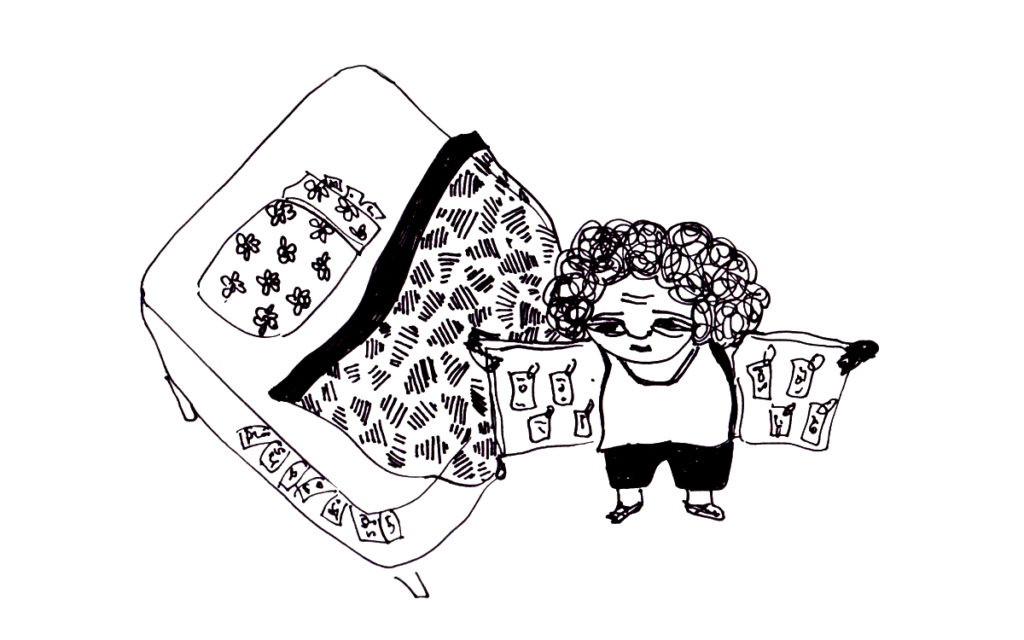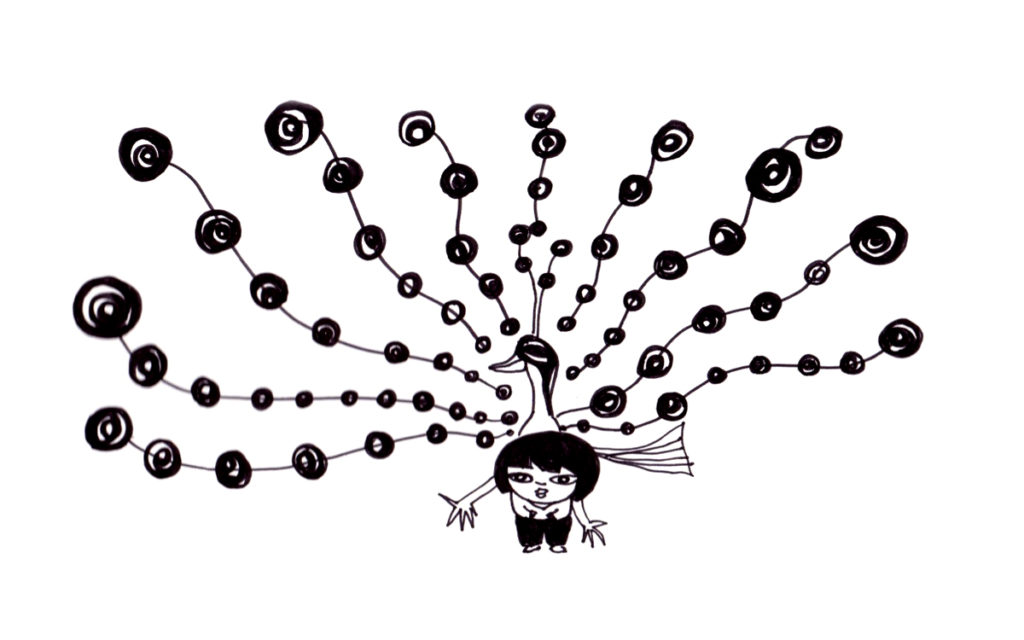How I Went From Being An Apolitical to A Little More Political Asian
 When I was a child, I remember writing Nancy Reagan about the pretty gowns she wore. I got back a generic letter with a lovely black and white photo of her and Ronny fishing in the Finger Lakes. I taped this photo to my wardrobe to remind me of how they brought Hollywood style to the White House.
When I was a child, I remember writing Nancy Reagan about the pretty gowns she wore. I got back a generic letter with a lovely black and white photo of her and Ronny fishing in the Finger Lakes. I taped this photo to my wardrobe to remind me of how they brought Hollywood style to the White House.
I didn’t understand their politics, but I also wasn’t raised to question politics.

You often hear the term “Apolitical Asian.”
My education began with stories told by my grandmother of the horrible things the Communists did in China. One story that remains ingrained in my mind was about my grandmother’s dear friend, Strong Paw. We spent many a sunny day with her roaming the streets of Queens when I was a child. I’ll never forget her. Strong Paw had a large perm that looked a gray tumbleweed had landed on her head one windy day and never left. She collected cans with us. She was the muscle. I was the hands. My grandmother was the hustle. Strong Paw held a large stick across her back and carried two bags, which I would fill with empty cans I handpicked from the neighborhood trash. The neighbors hated us for disrupting their garbage. Then my grandmother would hustle her way through the homeless crowd at the A&P to deposit her cans, fiercely elbowing and pushing anyone in her way. Needless to say, the homeless hated us, too.
 My grandmother told me about a Communist leader named Mao Zedong, who promised to bring food and wealth to the Chinese peasants who’d been starving and living in extreme poverty for too long. But with this promise came torture and murder for anyone resisting his authority. My grandmother told me Strong Paw was passionately against Mao, and yes, she spoke out.
My grandmother told me about a Communist leader named Mao Zedong, who promised to bring food and wealth to the Chinese peasants who’d been starving and living in extreme poverty for too long. But with this promise came torture and murder for anyone resisting his authority. My grandmother told me Strong Paw was passionately against Mao, and yes, she spoke out.

The consequences of speaking out were terrifying. The Communist militia ransacked her home and made her and her husband kneel on broken glass. They tortured them for days on end under the hot scorching sun. Strong Paw’s skin was peeling and burning, but they showed no mercy.

Those days, there were many ways of standing out that induced the wrath of the government. Scholars were called out for being too smart. They were dressed in dunce caps as their faces hung low. And they were forced to bark like dogs. Being too smart, being too wealthy, being too vocal, being too much of anything got you in trouble with Mao.

Now that I look back, I often wondered if Strong Paw collected cans so people would think she was poor, so no one would ever ransack her home, like they had in China. Maybe it’s why my grandma and so many of her friends sewed money inside their clothes. They also stuffed pillows and mattresses with dollar bills instead of saving them in banks. They didn’t trust banks and they didn’t trust the government. This way there was no official count of their money. No one would ever know how much they had. The goal was to be undocumented wealthy. To be invisible.
 These stories frightened me, to every bone in my body, as a child, and continue to frighten me as an adult, when I decide to speak up or stand out, whenever I am “too much.”
These stories frightened me, to every bone in my body, as a child, and continue to frighten me as an adult, when I decide to speak up or stand out, whenever I am “too much.”

But then something changed in me. It was the day of Trump’s inauguration. It woke me from my apolitical coma. The camera panned across the sea of people and what I saw was a sea of white. It felt like the only “dots” of diversity seen were of Barack and Michelle Obama. It saddened me to think how far we’ve come and now it looked like we were going backwards.
 It reminded me of when my parents were thinking about moving to Westchester, when I was five years old. The principal gave us a tour of the school and she opened the classroom door and it was a room full of blue and hazel eyes and alabaster skin. I remember screaming so hard, like I was auditioning for a Hitchcock film. I was scared by the lack of color and diversity. It was all I had known growing up. I was so glad when my parents decided to stay in Queens.
It reminded me of when my parents were thinking about moving to Westchester, when I was five years old. The principal gave us a tour of the school and she opened the classroom door and it was a room full of blue and hazel eyes and alabaster skin. I remember screaming so hard, like I was auditioning for a Hitchcock film. I was scared by the lack of color and diversity. It was all I had known growing up. I was so glad when my parents decided to stay in Queens.

At my high school in Queens, every culture was represented. And it felt like home.
There was Anita, a Guyanese girl whose long ponytail would whip across multiple faces as she walked briskly down the hallway. Gemal, an African American boy who sat next to me in class talking about life in general, making each other giggle. There were Mohamed and Mikel, South Asians with slight mustaches and glasses, which made them look older, like distinguished accountants. They were inseparable and always telling what seemed like charming Dad jokes. There was Eddie, a Mexican kid who was the class nerd–we all cheated off of his page during important state tests. I remember his Dad owned a tourism van, and he was kind enough to drive us to the prom in style. There was LoAnne, the Vietnamese beauty. She stole all the boys’ hearts while the rest of us struggled with pimples, bad perms, and raging hormones. There was Dawn, an Irish girl who used to come over and yak with me about the Mets, even though I didn’t know anything about baseball. We would trade lunches. I’d give her my beef ramen, which my grandma packed in my Popeye thermos, and she’d give me her Peanut Butter and Jelly sandwich and Dipsy Doodles.
In Trump’s vision of a Great America, I wondered, Where did I fit in? Where did my friends from Queens fit in? Would we have a voice?
This is not what my America looks like.
 That’s when I decided to march in DC. It would be my first march ever. It was both exhilarating and a little frightening, all at the same time. I didn’t know what to expect, but I knew it was important for me to be a part of. So, I booked a bus ticket from Penn Station to DC and lined up to march with a gang of women with pussy hats and signs, all ready to make history.
That’s when I decided to march in DC. It would be my first march ever. It was both exhilarating and a little frightening, all at the same time. I didn’t know what to expect, but I knew it was important for me to be a part of. So, I booked a bus ticket from Penn Station to DC and lined up to march with a gang of women with pussy hats and signs, all ready to make history.

As I marched through DC I thought of my Grandma and Strong Paw. I thought of how I had internalized this fear of standing out too much for too long. And how it kept me from a voice, and making waves of any kind.
Head down. No conflict. That was Asian.
 As I marched through DC, I thought of my 2-year-old son Miles who delighted in making perfect squares and triangles with Playdo, singing the alphabet and “Twinkle Twinkle Little Star” to his crew of stuffed animals. But the mother in me knew he sensed some iota of adult pain and anguish over the election. It’s probably why he insisted we watch Elmo over CNN.
As I marched through DC, I thought of my 2-year-old son Miles who delighted in making perfect squares and triangles with Playdo, singing the alphabet and “Twinkle Twinkle Little Star” to his crew of stuffed animals. But the mother in me knew he sensed some iota of adult pain and anguish over the election. It’s probably why he insisted we watch Elmo over CNN.
I thought about the divided America he would come to know over the next few years. I wanted Miles to grow up in a better world.

I wanted Miles to learn to embrace and demand diversity. I wanted him to know there was no place for bullies, that includes the presidency. I wanted him to respect all people regardless of gender and culture. I wanted him to know that if it was your body, it was your right. I wanted him to be brave in his voice.
I wanted him to be ruled by hope not fear.

I knew it was time to keep marching.

So, I called my local Congress people and left messages at the sound of the beep. Against the nomination of DeVos. Against the travel ban. Against the school voucher program. I spoke out against what I thought was unjust. I shared. I liked. I even commented on posts. And I donated to those organizations in jeopardy over the new administration, and to those organizations that amplified the collective voice of justice. I wouldn’t say that I became the biggest activist, but I became transformed in my own right. I cared about what was going on in my world and tried to change it in my small ways.

One favorite memory reminds me that I can’t stop fighting for what’s right. Every Sunday, my Dad would drive me and my family to the East River. We’d eat wonton noodles while sitting in his red Dodge Dart 75’. We’d pop in a cassette tape, crank the volume, and we sang at the top of our lungs to Neil Diamond’s “America.” I remember our bodies filling and bursting with a sense of freedom. I would imagine my father as an 8-year-old boy with my grandmother coming to America on a boat from China. They had “a dream to get them there.”
 Today Miles and I play Neil Diamond’s “America” at full volume at home, and we sing and dance without pants. We feel so free. Like America. We sing “They’re coming to America . . . My country ’tis of thee. Sweet land of liberty.”
Today Miles and I play Neil Diamond’s “America” at full volume at home, and we sing and dance without pants. We feel so free. Like America. We sing “They’re coming to America . . . My country ’tis of thee. Sweet land of liberty.”






Pingback: Read These Blogs – Marcus M. Wise